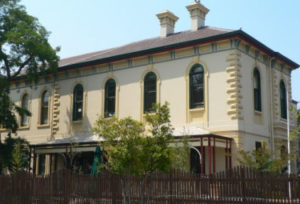
This is Marlton, Dr Madden’s home in St Kilda, Melbourne. (Now part of St Michael’s Church of England Grammar School). Photo courtesy of Peter Torokfalvy.
Henry Ridewood Madden MD LRCS (Edin) (10 March 1818 – 29 February 1884) was an influential early British homeopathic doctor who helped establish homeopathy in Brighton, England, and Melbourne, Australia. He was a colleague and friend of many notable homeopaths, including Robert Ellis Dudgeon and Richard Hughes.
Madden was born in Devizes, Devon in 1818, the son of an army officer. His father was transferred to Leeds where Henry received his education at the Town Grammar School. He went to Edinburgh University to study medicine and graduated with his MD in 1839.
Madden set up in practice nearby in the town of Penicuick. While there one of his instructors at Edinburgh, Professor William Henderson, experienced a noteworthy conversion to homeopathy, inspiring Madden to explore Hahnemann’s system for himself.
Madden, now also converted to homeopathy, visited Vienna in the winter of 1844-5, then one of the leading centres for homeopathy, to study under Wilhelm Fleischmann at the noted Gumpendorf Hospital, alongside fellow students George James Hilbers and a man who would become one of Madden’s closest friends, Robert Ellis Dudgeon.
After leaving Vienna Madden identified a practice in Brighton that was being sold by Dr. George Fearon, who was moving to Birmingham, as the ideal location to set up. Madden established a thriving practice there that he maintained until 1863.
In 1845 Madden opened the Brighton Homoeopathic Dispensary. He later made the Dispensary free and was joined there by medical officers Charles Cobbe and William Wardroper.
The same year Madden became the eleventh member of the British Homeopathic Society.
In July 1863, fatigued from overwork and displaying symptoms of Brights Disease (Nephritis), Madden quit Brighton for Australia. During the voyage he regained his vitality and on arrival in Melbourne promptly established a new and thriving practice among the town’s notables.
After three years Madden returned to England and began practicing in London. He was also appointed as physician at the London Homeopathic Hospital.
Madden was a member of the Hahnemann Medical Society and was on the editorial staff for the British Homoeopathic Review. During his career he contributed numerous articles to homeopathic publications and was appointed editorial convenor for the revised 1870 edition of the British Homoeopathic Pharmacopoeia, working alongside the illustrious figure of Frederick Hervey Foster Quin, President of the British Homeopathic Society. For the second edition Madden was succeeded as editor by William Vallancey Drury.
Henry Madden was elected President for the 1871 British Homoeopathic Congress, held in Oxford. However, a debilitating stroke just two weeks before the meeting prevented Madden from attending. His completed address, On the Relation of Therapeutics to Modern Physiology, in which Madden stressed the scientific basis of homeopathy, was delivered on his behalf by Madden’s Brighton colleague, the “Grand old Man” of British Homoepathy, Richard Hughes. Madden was subsequently attended in his infirmity by his old friends Dudgeon and Hughes.
In spite of his infirmity, in 1882-3, Madden was a Council Member of the British Homeopathic Society, alongside Hugh Cameron, William Valancey Drury, Robert Ellis Dudgeon, Robert Douglas Hale, Edward Hamilton, Richard Hughes, John Hamilton Mackechnie, James Bell Metcalfe, Alfred Crosby Pope, Charles Ransford, George Wyld and Stephen Yeldham.
Following his stroke Madden went into retirement, first in St John’s Wood, then to his home county of Devon, before finally Bloomfield Place, Bath, where he passed away in his sixty-sixth year, and was laid to rest in the abbey cemetery.
His obituary in the The British Journal of Homoeopathy lauded Madden, observing that “No purer and nobler soul walked this earth.“
Select Publications:
- Two Lectures on Agricultural Science … Read before the Highland and Agricultural Society of Scotland … Extracted … from the Transactions of the Society (1842)
- Homoeopathy Viewed in Connection with Medical Reform (1846)
- On the Use of Auxiliaries to Homoeopathic Treatment (1849)
- Lecture on Town Missions: Their Character & Claims: Delivered in the Town Hall, Brighton, on Friday, Jan. 23, 1852 (1852)
- Uterine Diseases (1852)
- On Mineral Waters (1855)
- “Contraria Contrariis” (1867)
- On “Nervousness”: Its True Nature and Treatment (1868)
- British Homoeopathic Pharmacopoeia, published by the British Homoeopathic Society. [With a preface by F. F. Quin and H. R. Madden.] (1870)
- On the Relation of Therapeutics to Modern Physiology (1871)
Of Interest:
Henry Madden’s son, Dr. Edward Monson Madden (1850 – 1908) followed in his father’s footsteps to become a notable homeopathic physician. Edward Madden was the driving force behind the founding of the Phillips Memorial Hospital in Bromley, Kent.


Leave A Comment